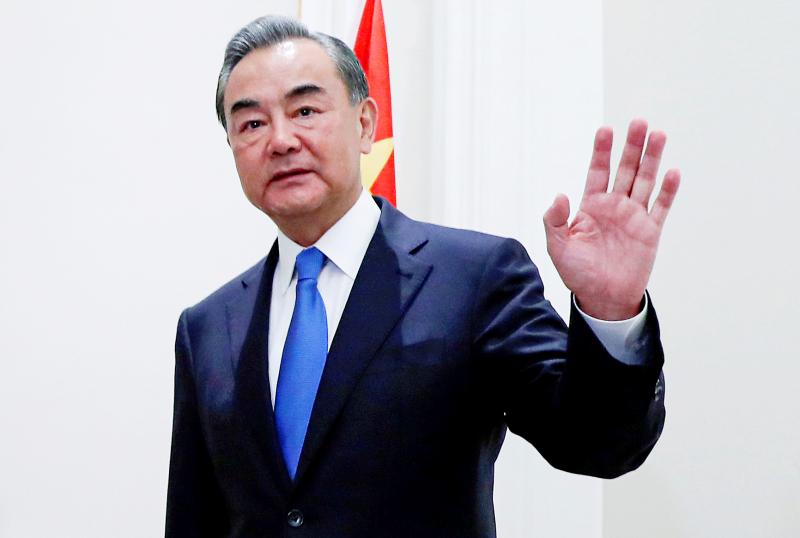French and German officials yesterday criticized Chinese Minister of Foreign Affairs Wang Yi (王毅) over a threat he issued because of Czech Senate President Milos Vystrcil’s visit to Taiwan.
Wang was on a five-nation visit to Europe to counter US pressure on issues such as democracy in Hong Kong and data security regarding apps such as TikTok and WeChat, which US President Donald Trump is seeking to ban.
However, Wang’s trip was overshadowed by comments he made on Monday, when he called Vystrcil’s visit to Taiwan a “provocation” and said that the senate president would “pay a heavy price.”

Photo: Reuters
French Ministry of Foreign Affairs spokeswoman Agnes von der Muhll on Tuesday said that the Europe-China relationship must be based on the principle of dialogue and reciprocity, as well as mutual respect, and that the EU would not accept threats made to one its member countries, French media reported.
German Minister of Foreign Affairs Heiko Maas echoed the sentiment, saying that while the EU welcomed foreign partnerships, it expected respect from them.
“Threats have no place here [in Europe],” Maas said.
Europe must be confident in its protection of its own interests and must avoid becoming a puppet of powerful nations like the US, Russia or China, he said, adding that he had communicated Germany’s support for the Czech Republic to Czech Minister of Foreign Affairs Tomas Petricek.
Maas also criticized China over human rights abuses, including mass internment of Uighurs in camps in Xinjiang and its implementation of national security legislation in Hong Kong.
Maas called on China to redact the Hong Kong legislation, to implement universal suffrage in the territory and to uphold its “one China, two countries” framework that promises a high degree of autonomy to Hong Kong and Macau.
However, Wang said that Xinjiang and Hong Kong were China’s internal matters and that foreign interference was unwelcome.
Slovak President Zuzana Caputova also spoke out about Wang’s threat to Vystrcil, tweeting that “#Slovakia stands by the Czech Republic. #EU-#China relations are based on dialogue and mutual respect.”
Slovakia and the Czech Republic were previously one nation, Czechoslovakia, but separated in 1993 and today maintain close ties.
“Threats directed at one of the EU members and its representatives contradict the very essence of our partnership and as such are unacceptable,” Caputova wrote.
Meanwhile, European Commission foreign affairs spokesman Peter Stano said that he was “unhappy to see such diplomatic language,” and that China and the Czech Republic should engage in dialogue.
The EU and China would continue to discuss Taiwan, Hong Kong and other issues, Stano said.

The US government has signed defense cooperation agreements with Japan and the Philippines to boost the deterrence capabilities of countries in the first island chain, a report by the National Security Bureau (NSB) showed. The main countries on the first island chain include the two nations and Taiwan. The bureau is to present the report at a meeting of the legislature’s Foreign Affairs and National Defense Committee tomorrow. The US military has deployed Typhon missile systems to Japan’s Yamaguchi Prefecture and Zambales province in the Philippines during their joint military exercises. It has also installed NMESIS anti-ship systems in Japan’s Okinawa

TRAGEDY STRIKES TAIPEI: The suspect died after falling off a building after he threw smoke grenades into Taipei Main Station and went on a killing spree in Zhongshan A 27-year-old suspect allegedly threw smoke grenades in Taipei Main Station and then proceeded to Zhongshan MRT Station in a random killing spree that resulted in the death of the suspect and two other civilians, and seven injured, including one in critical condition, as of press time last night. The suspect, identified as a man surnamed Chang Wen (張文), allegedly began the attack at Taipei Main Station, the Taipei Fire Department said, adding that it received a report at 5:24pm that smoke grenades had been thrown in the station. One man in his 50s was rushed to hospital after a cardiac arrest

‘WIN-WIN’: The Philippines, and central and eastern European countries are important potential drone cooperation partners, Minister of Foreign Affairs Lin Chia-lung said Minister of Foreign Affairs Lin Chia-lung (林佳龍) in an interview published yesterday confirmed that there are joint ventures between Taiwan and Poland in the drone industry. Lin made the remark in an exclusive interview with the Chinese-language Liberty Times (the Taipei Times’ sister paper). The government-backed Taiwan Excellence Drone International Business Opportunities Alliance and the Polish Chamber of Unmanned Systems on Wednesday last week signed a memorandum of understanding in Poland to develop a “non-China” supply chain for drones and work together on key technologies. Asked if Taiwan prioritized Poland among central and eastern European countries in drone collaboration, Lin

ON ALERT: Taiwan’s partners would issue warnings if China attempted to use Interpol to target Taiwanese, and the global body has mechanisms to prevent it, an official said China has stationed two to four people specializing in Taiwan affairs at its embassies in several democratic countries to monitor and harass Taiwanese, actions that the host nations would not tolerate, National Security Bureau (NSB) Director-General Tsai Ming-yen (蔡明彥) said yesterday. Tsai made the comments at a meeting of the legislature’s Foreign Affairs and National Defense Committee, which asked him and Minister of National Defense Wellington Koo (顧立雄) to report on potential conflicts in the Taiwan Strait and military preparedness. Democratic Progressive Party (DPP) Legislator Michelle Lin (林楚茵) expressed concern that Beijing has posted personnel from China’s Taiwan Affairs Office to its